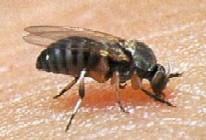
Many species of Black flies are found throughout the United States and elsewhere. Despite being annoying and biting, especially when there are a lot of them, no species of black flies in the United States is known to transmit disease to humans. They can transmit certain disease agents to livestock. Black fly larvae develop in flowing water, usually clean, non-polluted water that contains abundant dissolved oxygen. Black flies tend to be most active from spring through fall in the morning and early evening.
Chemical repellents such as those used against mosquitoes are said not to last very long when they are used for Black flies. Instead, experts advise taking specific measures to protect oneself against Black flies.
- Avoid areas where they are active during the day.
- Wear light colored long sleeve shirts, long pants, and a light colored hat.
- Apply an insect repellent when outdoors. Many natural food stores offer a selection of insect repellents that are minimally toxic to humans.
- Keep in mind that black flies are most active on cloudy, humid days with low wind.
In case of a heavy black fly infestation, contact an entomologist at your county Agricultural Extension office regarding the use of Bti (Bacillus thurigiensis israeliensis), an insect control agent that is effective in controlling black flies and mosquitoes but is said to be relatively harmless to mammals, birds, fish, and insects other than black flies and mosquitoes.
